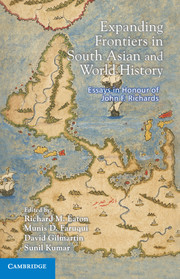Book contents
- Frontmatter
- Contents
- List of Contributors
- Foreword
- Introduction
- 1 At Empire's End: The Nizam, Hyderabad and Eighteenth-century India
- 2 The Ignored Elites: Turks, Mongols and a Persian Secretarial Class in the Early Delhi Sultanate
- 3 ‘Silk Road, Cotton Road or … Indo-Chinese Trade in Pre-European Times’
- 4 The Political Economy of Opium Smuggling in Early Nineteenth Century India: Leakage or Resistance?
- 5 Opium and the Company: Maritime Trade and Imperial Finances on Java, 1684–1796
- 6 The Mughals, the Sufi Shaikhs and the Formation of the Akbari Dispensation
- 7 Notes on Political Thought in Medieval and Early Modern South India
- 8 Becoming Turk the Rajput Way: Conversion and Identity in an Indian Warrior Narrative
- 9 Nature and Nurture on Imperial China's Frontiers
- 10 The Frontiers of Memory: What the Marathas Remembered of Vijayanagara
- 11 ‘Kiss My Foot,’ Said the King: Firearms, Diplomacy and the Battle for Raichur, 1520
- 12 Frontiers of Family Life: Early Modern Atlantic and Indian Ocean Worlds
- 13 Chinese Revenue Farms and Borders in Southeast Asia
- Publications
- Index
Introduction
Published online by Cambridge University Press: 05 January 2014
- Frontmatter
- Contents
- List of Contributors
- Foreword
- Introduction
- 1 At Empire's End: The Nizam, Hyderabad and Eighteenth-century India
- 2 The Ignored Elites: Turks, Mongols and a Persian Secretarial Class in the Early Delhi Sultanate
- 3 ‘Silk Road, Cotton Road or … Indo-Chinese Trade in Pre-European Times’
- 4 The Political Economy of Opium Smuggling in Early Nineteenth Century India: Leakage or Resistance?
- 5 Opium and the Company: Maritime Trade and Imperial Finances on Java, 1684–1796
- 6 The Mughals, the Sufi Shaikhs and the Formation of the Akbari Dispensation
- 7 Notes on Political Thought in Medieval and Early Modern South India
- 8 Becoming Turk the Rajput Way: Conversion and Identity in an Indian Warrior Narrative
- 9 Nature and Nurture on Imperial China's Frontiers
- 10 The Frontiers of Memory: What the Marathas Remembered of Vijayanagara
- 11 ‘Kiss My Foot,’ Said the King: Firearms, Diplomacy and the Battle for Raichur, 1520
- 12 Frontiers of Family Life: Early Modern Atlantic and Indian Ocean Worlds
- 13 Chinese Revenue Farms and Borders in Southeast Asia
- Publications
- Index
Summary
These essays were originally presented at the retirement conference for Professor John F. Richards, which was held at Duke University on 29–30 September 2006. The conference, entitled ‘Expanding Frontiers in South Asian and World History’, brought together students, colleagues and associates of Prof. Richards to discuss themes that have marked Richards' work as a historian in an academic career of almost 40 years. These themes focused on ‘frontiers’ in multiple contexts, all relating to Richards' work: frontiers and state building; frontiers and environmental change; cultural frontiers; frontiers, trade and drugs; and frontiers and world history.
Richards' academic work began with his study of Mughal administration on the Deccan frontier in Golconda in the late seventeenth and early eighteenth centuries. His first book, Mughal Administration in Golconda (1975), which grew out of his doctoral dissertation, introduced two themes that were to run through much of his later work. The first was a focus on the frontier as a key arena for understanding the processes of state building. Relations between state bureaucracy and local actors, including regional warrior elites, were central to Richards' story. Second, and perhaps even more important for the long-term trajectory of his interests, Richards emphasized the importance of state institutions and finance to the Mughal system. State institutions were something that Richards took very seriously, and if these ultimately failed to cement Mughal rule in Golconda, he attributed the fault to various failed policies pursued by individual Mughal rulers.
- Type
- Chapter
- Information
- Expanding Frontiers in South Asian and World HistoryEssays in Honour of John F. Richards, pp. xv - xviiPublisher: Cambridge University PressPrint publication year: 2013



